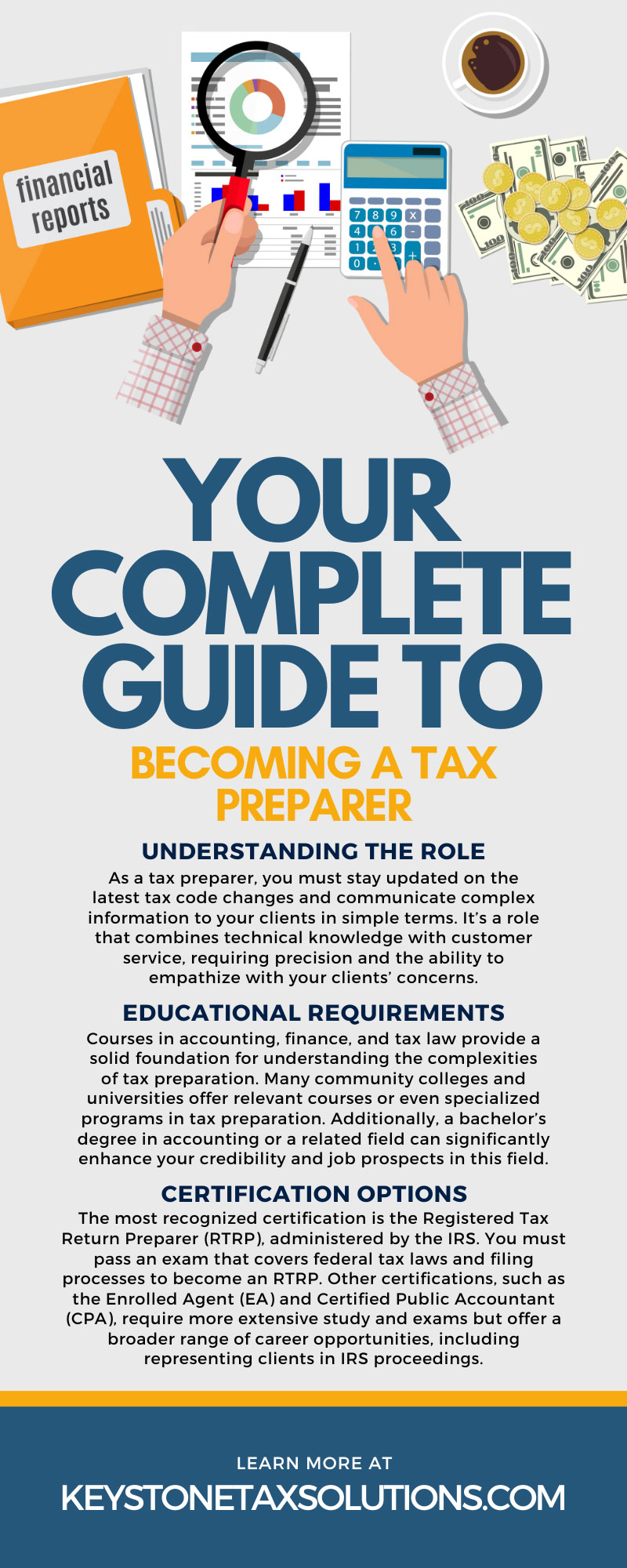Embarking on a career as a tax preparer can be both rewarding and challenging. With the right knowledge and tools, you can excel in this field, helping clients navigate the complexities of tax laws and regulations. Read on for your complete guide to becoming a tax preparer.
Understanding the Role
A tax preparer’s primary responsibility is to assist clients in accurately preparing and filing their tax returns. This role demands a thorough understanding of tax laws and regulations, along with strong analytical and mathematical skills. As a tax preparer, you must stay updated on the latest tax code changes and communicate complex information to your clients in simple terms. It’s a role that combines technical knowledge with customer service, requiring precision and the ability to empathize with your clients’ concerns.
Educational Requirements
While a specific degree isn’t mandatory to become a tax preparer, having a background in accounting or a related field can be extremely beneficial. Courses in accounting, finance, and tax law provide a solid foundation for understanding the complexities of tax preparation. Many community colleges and universities offer relevant courses or even specialized programs in tax preparation. Additionally, a bachelor’s degree in accounting or a related field can significantly enhance your credibility and job prospects in this field.
Certification Options
Obtaining a professional certification can elevate your standing as a tax preparer. The most recognized certification is the Registered Tax Return Preparer (RTRP), administered by the IRS. You must pass an exam that covers federal tax laws and filing processes to become an RTRP. Other certifications, such as the Enrolled Agent (EA) and Certified Public Accountant (CPA), require more extensive study and exams but offer a broader range of career opportunities, including representing clients in IRS proceedings.
Understanding Tax Laws and Regulations
An in-depth understanding of tax laws and regulations is fundamental for a tax preparer. This knowledge includes federal tax codes and state and local tax laws, as these can vary significantly. Keeping abreast of the latest changes and updates to tax laws is crucial. This ongoing learning process involves regularly reading tax law updates, attending workshops, and participating in continuing education courses.
Practical Training and Experience
Gaining practical experience is key to becoming a proficient tax preparer. This experience can involve working as an intern or junior tax preparer in a tax preparation firm, accounting firm, or financial institution. Such hands-on experience allows you to apply your theoretical knowledge in real-world scenarios, deal with various tax situations, and learn from more experienced professionals. Some firms offer training programs specifically designed for aspiring tax preparers.
Developing Customer Service Skills
You’ll deal directly with clients as a tax preparer, making strong customer service skills essential. These skills include communicating complex tax information clearly and concisely, being patient in addressing client concerns, and having a professional demeanor. Building a rapport with clients can lead to repeat business and referrals, which are crucial for your career growth in this field.
Registering With the IRS
All tax preparers must have a Preparer Tax Identification Number (PTIN) issued by the IRS. The process involves a background check and payment of a fee. You must renew this registration annually. It’s a straightforward process but an essential step to ensure you can legally prepare your clients’ federal tax returns.
Understanding Ethical Considerations
Ethics plays a significant role in tax preparation. As a tax preparer, you must adhere to high standards of honesty and integrity, ensuring that you’re providing accurate and lawful tax advice. Familiarize yourself with the IRS’s ethical guidelines for tax preparers, and consider joining professional organizations that promote ethical standards in tax preparation.
Building a Client Base
Developing a client base is crucial for a successful career as a tax preparer. Start by offering your services to friends, family, and local community members. Online and in-person networking can also help you connect with potential clients. Consider partnering with other financial professionals, such as financial planners or attorneys, who can refer clients to you.
Staying Organized
Organizational skills are critical for a tax preparer, especially during the busy tax season. You must manage numerous client files, each with specific documents and deadlines. Developing a systematic approach to handling these documents is essential. Utilize digital tools and software to keep track of important dates, client communications, and document storage.
Being organized also means being meticulous in your work—ensuring you fill out every form correctly and account for every necessary document. This level of organization streamlines your workflow and minimizes the risk of errors, which can be costly in this profession.
Investing in Professional Tools
The quality of your tools can significantly impact your efficiency and accuracy as a tax preparer. Professional tax software, which is more sophisticated than what’s available to the public, can handle complex tax situations and regularly receives updates to reflect the latest tax codes and regulations.
Additionally, consider investing in secure data storage solutions to protect sensitive client information. Other tools, such as document scanners and multiple monitors, can also enhance your productivity. Remember, investing in high-quality professional tools is not an expense but an investment in your business’s efficiency and reputation.
Continuous Learning and Development
Tax laws and regulations are always changing, and staying abreast of these changes is crucial for a tax preparer. Dedicate time each year to continuing education through courses, seminars, and webinars. Many professional associations offer resources and learning opportunities to their members. Reading industry publications and attending tax law updates are also essential practices.
Consider pursuing further certifications or specializations, which can open new opportunities and help you cater to a niche market. Remember, your growth as a professional is a continuous journey.
Marketing Your Services
Marketing is key to expanding your clientele and building your reputation as a tax preparer. Start by creating a professional website that outlines your services, qualifications, and contact information. Utilize social media platforms to share tax tips and updates, which can position you as an expert.
Engaging in local community events or joining business groups can increase your visibility. Encourage satisfied clients to leave reviews or testimonials, as positive word-of-mouth is a powerful marketing tool. Consistently delivering high-quality service is the best form of marketing—it builds trust and encourages referrals.
Utilizing Tax Software for Tax Preparers
Selecting the right tax software is a critical decision for any tax preparer. Look for software that simplifies the preparation and filing process and provides robust features like error-checking algorithms, integrations with financial software, and support for various tax forms.
A good software package will keep you informed about the latest tax laws and regulations, ensuring compliance and accuracy in your work. Some software also offers client portals, enabling secure and efficient document exchanges with clients. Investing in premium tax software for tax preparers is essential for delivering high-quality, efficient service to your clients.
Now that you have your complete guide to becoming a tax preparer, start by focusing on these key areas and developing a successful and sustainable career.



